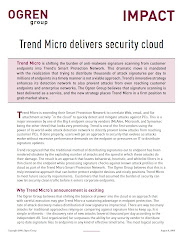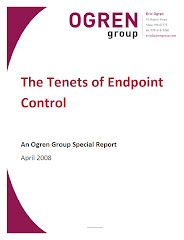My post-RSA research is moving along at a nice accelerating
pace! After being laid up for far too long, I have set an ambitious 2015 plan
intending to cover:
- User controls and behavior analytics,
- Next generation endpoint security,
- Securing virtualized infrastructures,
- Re-imagining file security, and
- Advances in practical network integrity monitoring
My user controls and behavior
analytics report is well underway
with several vendor briefings and a few background-only enterprise briefings
already completed with a June publish date targeted. As usual, my security
segment reports always come up with interesting trends - what started out as a
"protect the business against unauthorized privileged insider activity"
has become more of a "protect the business against malicious threats via inappropriate
user behavior detection". Makes sense in that security must detect malware
grabbing a user's credentials and enterprises always have more budget for
anti-malware provisions than for controlling users. Stay tuned as I did deeper
into some clever innovations that every security team should be evaluating.
Along the same line, vendors are looking at re-imagining file
security in light of malware protection and the evolution towards cloud
architectures. It is stunning to think in these days of disclosing sensitive
data loss that none of the primary security technologies - firewalls, antivirus,
IPS, IAM, SIEM - have any concept of file security! The best you can do is to
control access to servers, but honestly you cannot control where your files go
once they reach a remote PC. Fortunately, there are vendors worrying about what
happens to your files once they travel beyond the firewalls. There are some
excellent concepts discussed by SC Magazine and FinalCode in a May 21st webcast that you may find interesting.
A lot of vendors are scrambling for a category to detect
attacks that evade classical signature-oriented defenses. I am quite enthused
about the next generation endpoint players and about those looking at the
problem from a network integrity viewpoint. Lots seem to be scrambling towards EDR
even though nobody, including Gartner, really knows what EDR is. So I'll take a
crack at defining next generation endpoint security and network integrity with
an eye to solving specific enterprise problems that cannot be solved via
classical methods.
Finally, let's hope that the government actually does the
right thing by restricting NSA cyber activities, and that the NSA stops
treating laws like Massachusetts drivers treat yellow lights. Just because you
can eavesdrop, collect data on private conversations, and develop malware
attacks doesn't mean that you should. Mother's Day just passed - maybe the NSA
got an earful from their moms on how to behave?







